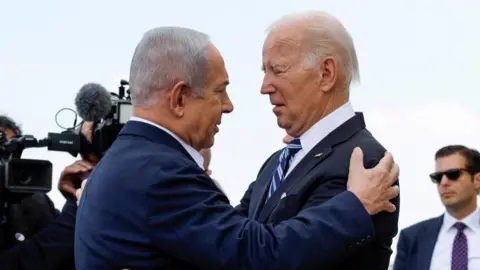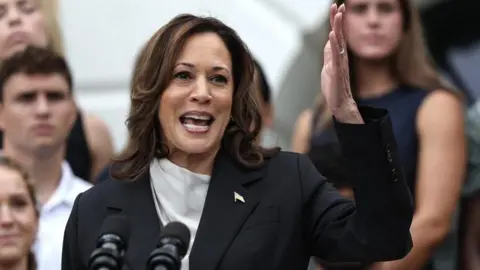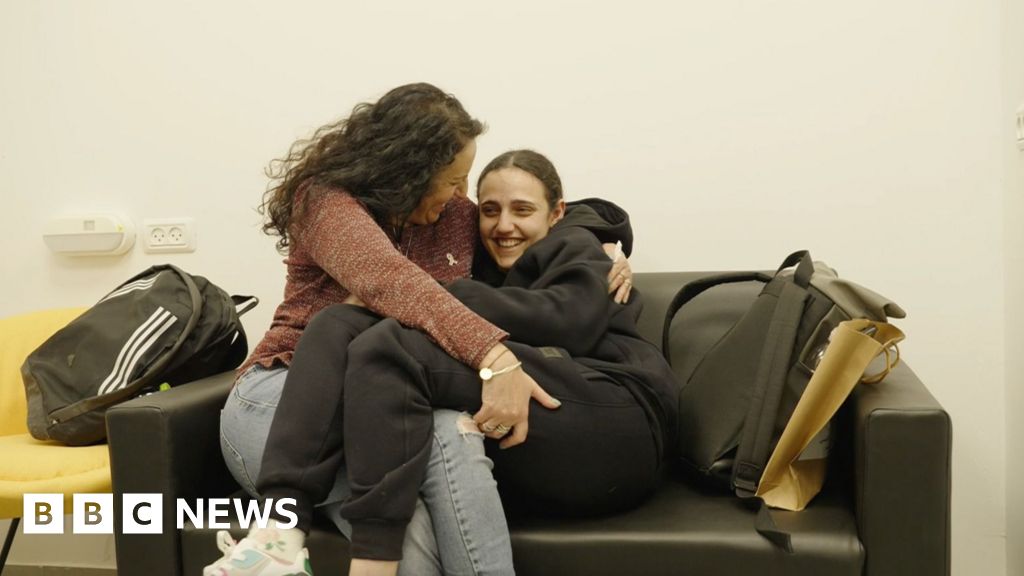ARTICLE AD BOX

 Reuters
Reuters
US President Joe Biden (right) flew to Israel just days after the 7 October Hamas attack
Israeli Prime Minister Benjamin Netanyahu visits the US this week under pressure to end the Gaza war, from both Israelis and the US administration. How might the political turbulence in Washington shape the trip and future relations?
Mr Netanyahu is set to meet Joe Biden – if the president has recovered from Covid-19 – and address a joint session of Congress, the only foreign leader to do so for a fourth time.
The trip offers him a platform for a reset with Washington after months of tensions over his hardline approach to the war, and an opportunity to try and convince Israelis that he hasn’t undermined relations with their most important ally.
But it is overshadowed by President Biden’s decision not to seek re-election, highlighting political uncertainties about Israel’s next partner in the White House and possibly eclipsing some of the attention on Mr Netanyahu’s visit.
The prime minister got a lot of unwelcome attention in Israel until the moment he boarded the plane.
A drumbeat of protests demanded that he stay home and focus on a ceasefire deal with Hamas to free Israeli hostages.
“Until he has signed the deal that's on the table, I do not see how he picks up and flies across the Atlantic to address the American political chaos,” said Lee Siegal, one of the family members who has come out to demonstrate. His 65-year-old brother Keith is a captive in Gaza.
The trip is a political move, he added, unless Mr Netanyahu stops being a “hurdle” and signs the ceasefire agreement.
Mr Siegel reflected a widespread view that Mr Netanyahu is slow-rolling the process for his own political reasons, roiling his negotiators when he recently threw new conditions into talks that seemed to be making progress.


Lee Siegal's brother, Keith, is one of the hostages still believed to be in Gaza
The prime minister has been accused of bowing to pressure from two far-right cabinet ministers who’ve threatened to bring down his government if he makes concessions to Hamas.
These perceptions have added to frustrations in the White House, which announced the latest formula for talks and had been expressing optimism an agreement could be achieved.
Mr Biden remains one of the most pro-Israel presidents to sit in the Oval Office, a self-declared Zionist who’s been lauded by Israelis for his support and empathy, cemented by his flight to Israel just days after the Hamas attacks on 7 October.
But since then, he’s grown alarmed at the cost of Mr Netanyahu’s demand for a “total victory” against Hamas in Gaza.
The administration is frustrated with the Israeli prime minister for rejecting a post war solution that involves pursuing a Palestinian state.
It’s angry with him for resisting appeals to do more to protect Palestinian civilians and increase the flow of aid to them. It’s facing a domestic backlash over the mounting death toll in Gaza. And it’s worried that the conflict is spreading to the region.


Protesters back home want Mr Netanyahu to focus on getting a ceasefire deal with Hamas to release the Israeli hostages
As Joe Biden’s presidency weakened in the swirl of controversy over his abilities, analysts said there might be less room for him to keep up the pressure on the Israeli prime minister.
But Mr Biden’s decision to drop out of the race could actually have strengthened his hand, says Ehud Barak, a former Israeli prime minister and a critic of Mr Netanyahu.
“He is not a lame duck in regard to foreign policy, in a way he's more independent (because) he doesn't have to take into account any impact on the voters,” Mr Barak told the BBC.
“With regard to Israel probably he feels more of a free hand to do what really needs to be done.”


Former Israeli PM Ehud Barak says inviting Mr Netanyahu back to Congress to speak was "a mistake"
Mr Barak believes it was a mistake for Congress to invite Mr Netanyahu to speak, saying that many Israelis blame him for policy failures that allowed the Hamas attack to happen, and three out of four want him to resign.
“The man does not represent Israel,” he said. “He lost the trust of Israelis…And it kind of sends a wrong signal to Israelis, probably a wrong signal to Netanyahu himself, when the American Congress invites him to appear as if he is saving us.”
Whatever politics he may be playing, Mr Netanyahu insists military pressure must continue because it has significantly weakened Hamas after a series of strikes against the military leadership.
In comments before departing Israel, he suggested that would be the tone of his meeting with President Biden.
“It will also be an opportunity to discuss with him how to advance in the months ahead the goals that are important for both our countries,” he said, “achieving the release of all our hostages, defeating Hamas, confronting the terror axis of Iran and its proxies and ensuring that all Israel’s citizens return safely to their homes in the north and in the south.”
He’s expected to bring the same message to congress, “seeking to anchor the bipartisan support that is so important to Israel”.
The reality is that Mr Netanyahu’s polices have fractured that bipartisan support. The Republicans are rallying around him, but criticism from Democrats has grown.
The Democratic Senate Majority leader Chuck Schumer caused a small earthquake in Washington recently when he stood up in the chambers and said Mr Netanyahu was one of the obstacles standing in the way of a lasting peace with Palestinians.
“I hope the prime minister understands the anxiety of many members in congress and addresses them,” the former US ambassador to Israel, Thomas Nides, told the BBC at the weekend. He’d been addressing one of the many rallies demanding a hostage release.
That includes “on humanitarian issues and to articulate that this fight isn’t with the Palestinian people, it’s with Hamas."
It’s a message that Kamala Harris would repeat if she were to become the Democratic nominee. There’d be no change in US policy: a commitment to Israel’s security while pushing for an end to the Gaza conflict and a plan for the Day After embedded in a regional peace with Arab states.
But there might be a difference in tone.
Ms Harris does not share Mr Biden’s long history with and emotional ties to Israel. She’s from a different generation and “could more closely align with the sentiments of younger elements of the Democratic party," says Mick Mulroy, a former deputy assistant secretary of defence for the Middle East.
"That’s a stance more likely to include restrictions on weapons, on munitions from the United States for use in Gaza," he said.

 EPA
EPA
Experts say there's unlikely to be change in US policy towards Israel under a possible Kamala Harris presidency, but there might be a change in tone
Mr Netanyahu could very well use the visit to steer the conversation from the controversy over Gaza to the threat from Iran, a topic with which he’s far more comfortable, especially after the recent escalation with Iran-backed Houthi rebels in Yemen.
But his main audience will be domestic, says Tal Shalev, the diplomatic correspondent at Israel’s Walla News.
He wants to revive his image as “Mr America,” she says, the man who can best present Israel to the US, and to restore his image which was shattered by the October 7 attacks.
“When he goes to the US and speaks in front of Congress and [has] a meeting in the White House, for his electoral base, it's the old Bibi is back again,” she says, referring to the prime minister by his nickname. “This is not the failed Bibi who was responsible for the seventh of October. This is the old Bibi who goes to the Congress and gets the standing ovations.”

 Reuters
Reuters
Many believe Mr Netanyahu (right) is playing for time - hoping Donald Trump will win the US presidential election and ease some of the pressure on him
It also gives him an opportunity to pursue connections with the former President Donald Trump at a time of great political flux in Washington.
“Netanyahu wants President Trump to win,” she says, “And he wants to make sure that he and President Trump are on good terms before the election.”
There is a widespread view that Mr. Netanyahu is playing for time, hoping for a Trump win that might ease some of the pressure he’s been facing from the Biden administration.
“There is a near-universal perception that Netanyahu is eager for a Trump victory, under the assumption that he will then be able to do whatever he wants,” writes Michael Koplow of Israel’s Policy Forum.
“No Biden pressuring him on a ceasefire or on West Bank settlements and settler violence... There are many reasons to doubt this reading of the landscape under a Trump restoration, but Netanyahu likely subscribes to it.”
The question is whether that pressure from Biden will ease as he steps away from the presidential race, or whether he will in fact use his remaining months in office to focus on achieving an end to the Gaza war.

 5 months ago
16
5 months ago
16








 English (US) ·
English (US) ·